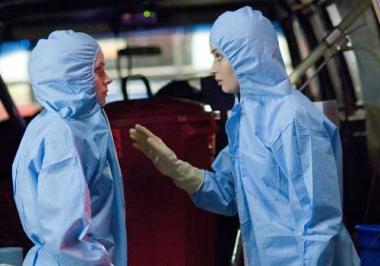Sunshine Cleaning
Directed by Christine Jeffs. Written by Megan Holley. With Amy Adams, Emily Blunt, Alan Arkin, Jason Spevack, Steve Zahn, Mary Lynn Rajskub, and Clifton Collins, Jr. (R)
Sunshine Cleaning is one of the quieter kinds of movies popular today, one that, while marketed as a comedy, really falls somewhere between that and tragedy, though always turning, in the end, to uplift. These movies, whose recent forebears are films like Juno or almost anything by Wes Anderson, get at audiences less through laughs than by tapping into some essential undercurrent of sadness; their writers and directors seem to understand that the vast majority of us have—maybe even more often than not—been disappointed by life.
A sad-eyed Amy Adams stars as Rose Lorkowski, ex-cheerleader, currently employed by a cleaning service that tends to the well manicured McMansions her old classmates now live in with their wealthy, absent husbands. Rose, stuck in the past, is still sleeping with her old quarterback boyfriend Mac (Steve Zahn), a married police detective.
He inadvertently gives her the impetus to turn her life around when he mentions that there is good money in crime-scene cleanup. Struggling to raise the money to send her troubled son to a private school, Rose enlists her perpetually unemployed sister Norah (Emily Blunt, fabulous) as an assistant and starts picking up jobs with the help of friendly janitorial supply vendor Winston (Clifton Collins, Jr.).
But if it seems like a setup for gross-out hijinks, the film is deeper than it lets on: Rose and Norah's mother, a literal one-time actress, committed suicide when they were girls, leaving their father Joe (Alan Arkin) to raise them. The daughters still scan late-night television in hope of catching a fleeting, snowy glimpse of their mother. What seems odd at first—that they could do this job at all—is instead what lets them move on with their lives.
Indeed, most of the gags go to Arkin as a self-styled entrepreneur always scheming to make a buck. Tossing aside the old saw about not working with kids—the last time he did it, with the same producers, he won an Oscar—Arkin and his on-screen grandson (named—coincidentally?—Oscar) carry on like a pair of old grifters. It's a sweet performance in a surprising movie, a movie whose magic turns the line "I'd recommend the pecan pie" into a bona fide tearjerker.
*
In writing this column, I'm continually surprised by the richness of the Valley's film culture—even at the simple fact that there is enough going on every week to make such a column not only possible, but, I hope, useful in sorting through it all. A lot of that richness comes from the region's unique concentration of colleges, community-minded free thinkers, and expat urbanites who demand that their bucolic surroundings come with a good dose of high culture.
Still, it can be a useful thing to have a central conduit to help channel the deluge, and in the last year, Amherst Cinema and Pleasant Street Theater have done a commendable job in hosting a variety of small film festivals, director talks, and single-night special events. It's all the more remarkable considering the dismal economy (these are not "Star Wars at midnight" blockbusters) and the fact that the theater group is barely over a year old. This week alone, they play host to three directors and a major poet. Read on for details.
After a long career spent making experimental shorts and documentaries, Alex Rivera's first feature, the award-winning Sleep Dealer, comes to the area this week. Presented by Amherst College and Hampshire College in a Wednesday evening screening at Amherst Cinema, Rivera, who studied political theory at Hampshire College, will be on hand to introduce and discuss his film.
The film is a science-fiction story that eschews the lasers-and-aliens trappings of the genre in favor of social commentary. In Rivera's future, the cheap labor of an immigrant workforce is realized remotely; instead of crossing the border themselves, this new generation of "node workers" provide their services by hooking themselves into a vast network that allows them to control robot counterparts from afar. The result is the natural endgame of America's vision of immigration: "all the work without the workers." Rivera calls it "a reflection on outsourcing, a reflection on the position that immigrants have in this country today, where they're made invisible from the political system." (Rivera co-wrote the script with David Riker, who, 10 years ago, made another film about Hispanic immigrants, La Ciudad, that is still worth looking up.)
Like other brooding sci-fi films before it—Blade Runner is an obvious touchstone, as are Isaac Asimov's robot stories—Sleep Dealer takes a leery view of the road we're traveling down. (Although Rivera notes that, in similar films, "the drama comes from the idea that the robots will wake up and want to kill the people. In my film…the robot wants to take your job.") And like those works, it's more interested in the depth of its story than many of its fellow travelers, a fact reflected in the nature of the two awards the film won at Sundance: the Alfred P. Sloan Prize for the best film dealing with science, and the Waldo Salt Award for Screenwriting. Not a common pairing, to be sure—would that it were—but one that here is well deserved.
Also this week, film and poetry come together for a good cause in Northampton. In Praise of the Earth unfolds Sunday evening at Pleasant Street Theater, an event bringing nationally known poet Wally Swist to town to benefit Clara Gardner, a Northampton teenager who was seriously injured after being struck by a drunk driver last August.
Swist, whose poems have been praised by former Poet Laureate Richard Wilbur as "doing justice to the natural, the human, and the divine, and treating none of these as refuge from another," will be joined by Hadley-based filmmaker Elizabeth Wilda, whose accompanying short film centers on Amherst's Fort Juniper. Built in the late '30s by Swist's mentor Robert Francis, the cabin has been an artist's retreat for the last two decades, and home to Swist during three year-long turns as poet-in-residence. Both poet and filmmaker will be on hand for questions after the screening.
Yet another filmmaker comes to Amherst this week to present her latest film when director Pamela Boll arrives for a Tuesday screening of Who Does She Think She Is?, her documentary look at the difficulties faced by "five fierce women who refuse to choose." Though they range in age from 27 to 65, all of them bump up against our society's expectations as they try to forge their careers in various fields of art, something that kept Boll herself from pursuing an art career for most of her life. At the same time, they find themselves struggling with questions about the intersections of artistic fulfillment, marriage and motherhood.
It has been noted that in economic lean times, movies continue to flourish; they are (for now) still one of our more inexpensive indulgences. So if you find yourself going to the theaters a little more often these days, be sure to take a look at some of the less well-known work being screened at Amherst and Pleasant Street; a rare schedule in the best of times, their continued bookings in a downturn speak to a commitment to something more than money.
Jack Brown can be reached at cinemadope@gmail.com.



